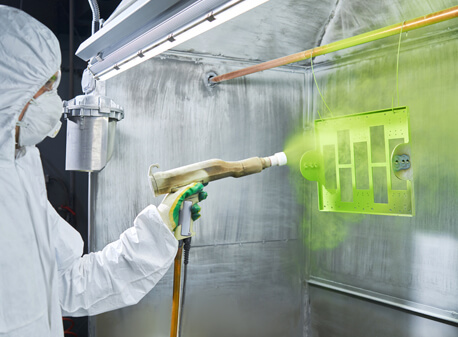
What is Electrostatic Powder Coating?
Electrostatic powder coating is a solvent-free production stage that uses electrically charged particles to paint a part more efficiently. This non-flowing dyeing type is also known as electrostatic powder coating. Powdered particles or paint in atomized liquid form are initially sent towards a conductive part using normal spraying methods and then accelerated towards the part with a strong electrostatic charge.
Powder paint, which is used as functional and decorative, is applied in a dry and free flowing state. The biggest difference between powder paint and wet paint is that powder paint does not require the use of solvents to enclose the filler, pigments and resin. Powder paint, which is generally applied electrostatically, is baked for a certain period of time at 120 to 240 degrees to obtain a hard and smooth surface.
How to Apply Powder Coating?
The chargeability of electrostatic powder paints gives optimum performance when free from moisture and in a fluid state. In case the storage temperature is colder than the application environment due to the moisture absorption of powder paints, it is recommended to wait at the application ambient temperature without opening the mouth before discharging into the chamber. Storage and application in ventilated areas where the temperature is below 30 ° C ensures optimum performance from powder paints.
The following required steps ensure that powder coatings can be obtained with high efficiency:
It should not be used in sealant application equipment.
It should be baked at the temperature and time indicated on the product.
Powder coating should be applied with a suitable electrostatic gun.
Grounding should be done well, metal-to-metal contact should be provided.
Appropriate work clothes (mask, overalls, etc.) should be provided before the application.
It is very important that the compressed air is free from moisture and oil.
Powder paint should not be kept in the chamber for a long time, and if the powder paint in the chamber is moist, it should be ventilated for a certain period of time to remove moisture or fresh paint should be used.
The suction pipe must be in good contact with the powder paint in the hopper. Powder coating booth should be operated as recommended by the manufacturer.
The recycled paint should be added to fresh paint at the recommended rate to prevent degradation in application performance.
The recycling paint should be emptied into the chamber after eliminating foreign materials that may have been mixed with the recycle paint.
Advantages of Powder Coatings
Powder coating provides better mechanical strength and corrosion, smooth surface appearance.
Powder paint has a longer life and durability than wet paint.
It provides the necessary conditions for many sectors and its application area is quite wide.
Unlike the wet paint, the powder paint that falls into the application cabinet can be collected and used again, so that almost 100% of the paint is utilized.
It is ready to use as it does not require mixing and thinning.
Paint surface between 60-100 microns is obtained in one application without flowing. At the same time, a paint surface up to 200-350 microns is obtained in 2 or 3 applications in casting and thick materials.
During powder paint application, it does not generate harmful waste compared to wet paint and is environmentally friendly.
The paint color range for the decorative product is also quite wide.
There is no freezing and melting problem.
It does not require pre-coating.
Where is Powder Coating Used?
Aluminum industry
Steel Door Industry
Machinery Industry
Lighting industry
White goods industry
Automotive Sub-Industry
Metal Furniture Industry
Steel Rack Industry
Park garden furniture and fence manufacturing
Manufacture of playgrounds for children
Manufacture of agricultural tools and equipment
Manufacture of electrical panels
Panel radiator manufacturing
Bicycle manufacture
 Türkçe »
Türkçe »